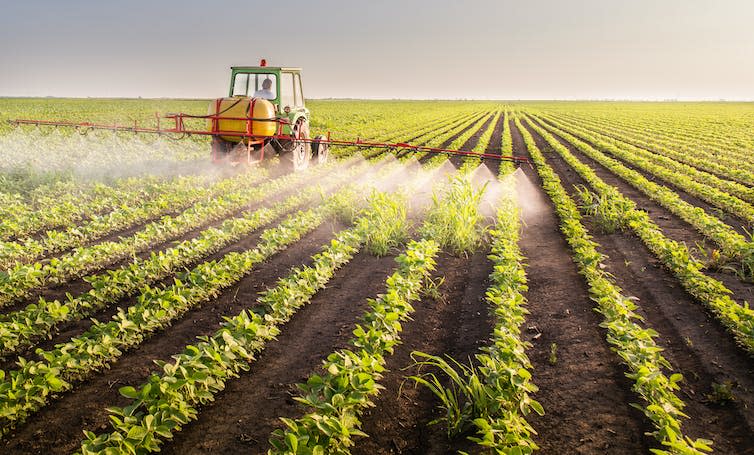The European Commission launched a proposal in July 2023 to deregulate a large number of plants produced using new genetic techniques.
Despite extraordinary efforts by the Spanish presidency to force a breakthrough, EU members have not yet reached a consensus on this plan. But if the proposal were approved, these plants would be treated the same as conventional plants, eliminating the need for safety testing and labeling of genetically modified food products.
The European public has refused to blindly accept genetically modified foods since the technology was developed, largely due to concerns about corporate control, health and the environment.
Biotech companies have been trying to sell genetically modified crops to Europeans for decades. But most European citizens remain convinced that crops made with both old and new genetic techniques should be tested and labeled.
Where does this proposal come from? Biotech companies appear to have succeeded in convincing the European Commission that we need new genetically modified crops to tackle climate change. They argue that by increasing crops’ resistance to drought or improving their ability to sequester carbon, climate change may no longer seem like such a major challenge.
If this seems too good to be true, unfortunately it is. Biotech companies have taken advantage of growing concerns about climate change to influence the European Commission with an orchestrated lobbying campaign.

Climate objectives as a PR strategy
In 2018, the European Court ruled that plants created with new genetic techniques should be regulated like any other genetically modified organism. Biotech companies and their allies within biotech research centers have since tried to convince the European Commission of the need for entirely new legislation.
The first step was to rename the techniques they use, with the aim of distancing themselves from the bad reputation of genetic modification. Biotech companies instead started using more innocuous terms like gene editing and precision breeding.
They then argued that their processes are not really different from what happens in nature, portraying them as an advanced version of natural processes. Biotech companies need this argument to eliminate the labeling requirement, which serves as a barrier to selling their products in a climate of public disapproval.
In a third step, they used the urgency of the climate crisis to argue that we cannot afford time-consuming safety tests. They argued that such tests would hinder innovation in a period of accelerating climate change.
There are several shortcomings in this approach. The terms ‘gene editing’ or ‘precision breeding’ may sound more reassuring, but we argue that they are essentially marketing terms and say nothing about the accuracy of the techniques used or their potentially negative effects.
Studies have shown that new genetic techniques can change the traits of a species “to an extent that would be impossible, or at least very unlikely, with conventional breeding.” They can also cause significant unintended changes in the genetic material of plants.
But perhaps most importantly: genetically modified plants are not the solution to the climate crisis. They are a false solution that starts from the wrong question.
False promises
Our current agricultural model is known to contribute significantly to climate change. The development of genetically modified crops is largely driven by the same agrochemical giants that established and control this form of agriculture.
Companies such as Corteva and Bayer (which acquired the American agrochemical company Monsanto in 2018) are at the forefront of the race to secure patents on new genetic techniques and their products.
Typical examples are patents for soybeans with an increased protein content, waxy corn or rice that is tolerant to herbicides. These crops are designed for an agricultural model that focuses on the large-scale cultivation of individual crop varieties intended for the global market.
This agricultural model relies on staggering amounts of fuel for distribution and places farmers in a state of dependence on heavy machinery and agricultural inputs (such as fertilizers and pesticides) derived from fossil fuels.
Research has shown that farming in this way causes soil depletion and biodiversity loss. It also increases vulnerability to pests and diseases, necessitating the development of different and potentially more toxic pesticides and herbicides.
Although biotech companies play the climate card, only a small portion of genetically modified crops being developed face climate-related concerns. In fact, the climatic qualities of many of these crops are questionable. Adjustments such as a longer shelf life or better resistance to transport are only intended to facilitate the operation of our unsustainable food system.
Instead of reinforcing our unsustainable agricultural model, the focus should be on restoring what industrial agriculture has destroyed: farmers’ livelihoods, biodiversity and soil health. Only then will farmers be able to cultivate a local climate that naturally sequesters carbon and provides optimal conditions for food production, without putting as much pressure on the environment.


Pay the price
Biotech companies are advocating ‘no testing’ policies, claiming new genetically modified crops are safe. But there is a problem. The legislation proposed by the European Commission eliminates the possibility of ever finding out whether these claims are correct.
Health and environmental problems are often the result of complex, interacting and largely invisible causes. Because tracing and labeling will not be mandatory, it will be very difficult to trace any negative effects back to their causes.
Ultimately, people and the planet will pay the price as untested genetically modified crops enter our environment and the food chain.
In response to this article, a spokesperson for the American Seed Trade Association said plant breeders must have every tool at their disposal to provide farmers with better plant varieties so they can continue producing in a challenging environment. The association said there is consensus among plant breeders and regulators that innovative techniques, such as genome editing, can be safely integrated into breeding programs. Bayer and Corteva were contacted for comment on the issues raised in this article but had not commented at the time of publication.


Don’t have time to read as much about climate change as you’d like?
Instead, get a weekly digest in your inbox. Every Wednesday, The Conversation’s environmental editor writes Imagine, a short email that delves a little deeper into just one climate issue. Join over 20,000 readers who have subscribed so far.
This article is republished from The Conversation under a Creative Commons license. Read the original article.


The authors do not work for, consult with, own shares in, or receive funding from any company or organization that would benefit from this article, and have disclosed no relevant affiliations beyond their academic appointment.